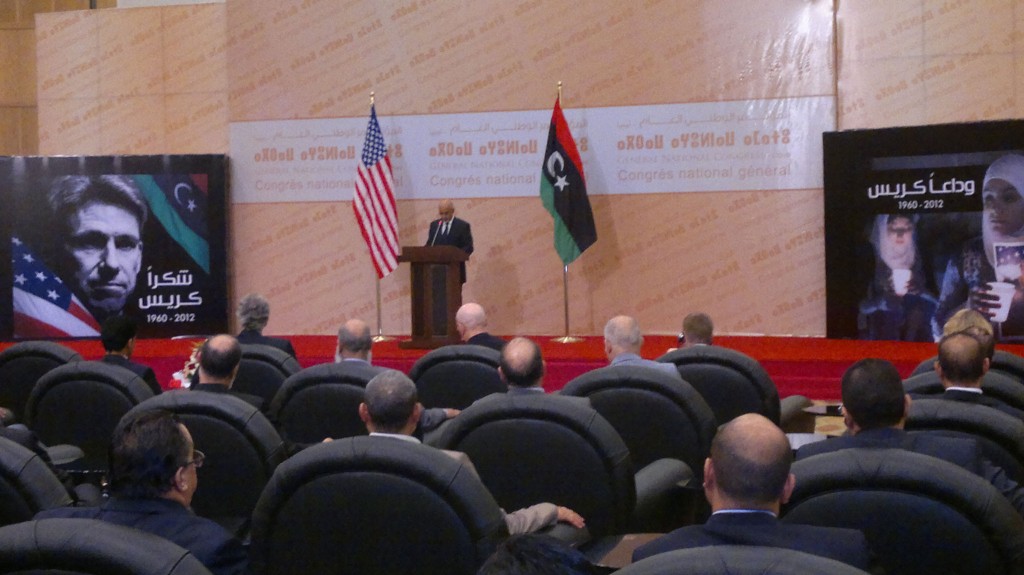By Ashraf Abdul Wahab and Michel Cousins.

Tripoli, 20 September:
Libyan Prime Minister Abdurrahim Al-Kib together with members of the government as well . . .[restrict]as of the General National Congress, led by Congress President Mohamed Magarief, attended a memorial service late this afternoon to honour US ambassador Chris Stevens, killed with three other US diplomats in Benghazi last week. The impressive and moving ceremony was held in the Rixos Convention Centre which now functions as the seat of Congress.
Also there to pay their respects and likewise demonstrate Libyan solidarity with the United States were Prime Minister-elect Mustafa Abushagur, several members of the former National Transitional Council, as well as officials and representatives from civil society organisations. It was one of the biggest gatherings of the Libyan political establishment since the revolution.
The US Deputy Secretary of State, William Burns led a delegation from Washington for the ceremony, the first US visit to Libya since the Benghazi attack. All the ambassadors and chargés d’affaires currently in Libya as well as representatives of international organisations were in attendance.
After the Libyan and US national anthems were played, Congress President Magarief standing beside a massive photo of the murdered ambassador spoke of the shock of killing and sense of loss. Having played a crucial role in Libya during the revolution, Stevens had helped it in its hour of need. “He gained the trust of the Libyan people,” he said.
Magarief also praised Washington’s measured response to the Ambassador’s murder. “We appreciate those statements which express a genuine desire to support the Libyan people in achieving freedom and democracy,” he said.
Stevens’s killers did not represent the Libyan people, Prime Minister Kib said. Denouncing the killing, he vowed the perpetrators would be brought to justice. They were outlaws who “must be held accountable”, he told those attending.
Other speakers promised that those responsible would be tracked down. The death of Stevens would not pass in vain, they said. On the contrary, it would strengthen the resolve of the Libyan authorities to deal with the security situation and do so effectively. It would also create deeper bonds of cooperation between Libya and the United States.
Burns, who had earlier met with Libyan Foreign Minister Ashour Ben Khayal as well as military officials, likewise said that the slayings would not be allowed to affect US relations and cooperation with Libya.
Foreign Minister Khayal spoke of the deep respect that Libyans had for Stevens and of the sincerity of his efforts to help the Libya people both at the time of the revolution and since. His death was a “painful loss”.
The head of the UN Support Mission in Libya, Ian Martin, whose last official function this was, called Stevens “an optimist for Libya”. He had believed that its revolution would build a fair and democratic society.
The most moving speech, however, came not from political figures but from a representative of a civil society organisation, Mervat Mhani of the Free Generation Movement. She had known Stevens personally. Libyans had lost someone “who had believed in the Libyan revolution from Day One”, she said. He had been sincere in his support, but very down to earth. “Libyans’ hearts were broken” when he was killed, she said. As for the Free Generation Movement, it would “never forget” him. “The world needs more Chris Stevens’s” she said. “May you rest in peace.”
[/restrict]







